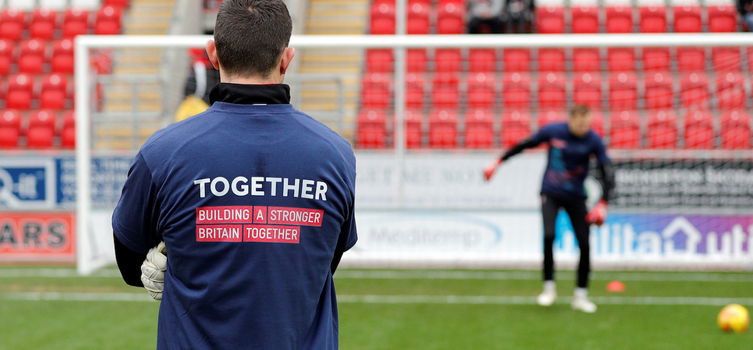Return to training protocols uncovered

Written by Simon Austin — May 15, 2020
A new range of roles and responsibilities will emerge at training grounds in the coming weeks as football resumes in the COVID-19 world.
The EFL has sent its draft Protocol for Return to First Team Training to clubs, requiring them to have a COVID-19 officer and allocate new staff duties including disinfecting GPS units and conducting small-group training without tackling.
The protocol, which TGG has seen, is largely the same at that of the Premier League, which has taken the lead on medical and performance guidance for English football following the outbreak of the pandemic.
It will require the agreement of clubs before being implemented. A meeting of the League One and Two clubs took place today, while the Premier League shareholders will be voting on Project Restart on Monday.
This could pave the way for training in small groups to begin on Tuesday, with a comprehensive testing programme already having started this week.
Below is a summary of the 47-page protocol:
TESTING
- No player or member of staff permitted to attend the training ground unless they have submitted to a coronavirus test within 48 hours of their intended arrival, which has returned a negative result.
- All players and staff must be submitted to a test twice per week.
- If a player/ member of staff displays symptoms or returns a positive test, they should isolate for seven days.
- The club doctor will be made aware of test results approximately 24 hours after the laboratory receive the samples.
- The League will receive anonymised reports of the test results at the same time as the club receives individual identifiable results.
- The testing program will be funded by the League, which will provide all reasonable logistical support to ensure that the program runs effectively.
- Testing is being funded by the EFL and Hong Kong-based Prenetics is set to oversee the process, as it is doing for the Premier League.
BEFORE TRAINING
- Each club must ensure that, before any player or member of staff attends the training ground, they have provided written confirmation that they have received and agree to the terms of the club’s COVID-19 policy
- Prior to entering the site, players and staff must complete a screening protocol devised by the club doctor (will normally include a non-invasive temperature check and medical questionnaire)
- No manual therapy treatment (including soft tissue therapy and massage), unless absolutely essential and approved by the club doctor in advance
- No congregation in communal areas, including medical rooms. Gym area to remain closed.
- Only players and essential staff at the training ground.
- Restaurants and cafeterias to remain closed. Clubs may open kitchens to provide takeaway food for players to eat away from the training ground. This should be left at a designated collection point upon exit from the ground. No players permitted entry to the kitchen.
- No player or member of staff permitted to access the dressing room, other than to use the toilet and/ or hand basin (if no other toilet facilities are available). No shaving, showering or further use permitted.
- No player permitted to store any personal items or technical equipment (except football boots) at the training ground
- No use of ice bath, cryogenic chamber or similar.
SMALL GROUP TRAINING
- Players should arrive in their own cars/ transport already changed and ready to train. They should bring their own drinks.
- Players may only access the training ground and pitch during a designated time slot. These will be staggered in groups of a maximum of five players per pitch, with three members of staff.
- Players should receive their training drills the night before via on-line channels.
- All players and staff must keep at least two metres away from each other wherever possible.
- Training drills should be carried out without the use of equipment (or limited as much as possible). Footballs, GPS units and other required equipment should have previously been allocated and disinfected.
- Maximum of 75 minutes for small group training.
- Examples of activities that are prohibited = tackling activities, congested training in small areas.
- Examples of activities that are encouraged = unopposed technical activities (i.e. passing, shooting, crossing and finishing etc.)
- Goalkeepers may either work one to one with the goalkeeping coach (observing social distancing) or integrated into the small group training.
- Members of the coaching staff will be able to watch the session at a safe distance.
- Where possible, a physiotherapist should be assigned to a working group. They should only provide minimum levels of treatment and should not work with any other group. (It is acknowledged that this may not be practical for some clubs particularly at League One and Two level).
POST-TRAINING
- Players gather the equipment they arrived with. GPS units should be removed by the player and left in pre-allocated area.
- GPS units should only be handled by staff wearing PPE and should be disinfected before handling.
- Staff will disinfect any relevant area/ surface after the session, including corner flags, cones, goalposts, equipment and GPS units
- Players should depart in their kit including any strappings.
- Minimum of 30 minutes between each training group to allow for cleaning of the areas and equipment.
- Should any member of the playing group test positive for COVID-19 / display symptoms / interact with someone who tests positive, the whole group is required to self- isolate for 14 days. This protocol is subject to review at this time, in-line with government guidelines.






-1.png)





